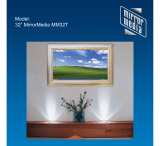Page is loading ...

TX-60ASR800
e
HELP
English

- 2 -
my Home Screen
my Home Screen
•Information 12
•How to use 13
•Settings 14
•OSD Colour 16
APPS List
•Information 17
•How to use 18
•Settings 19
Watching
Basic
•Satellite connection 20
•Basic connection 22
•Selecting channel 24
•Information banner 25
•Option Menu 28
•Subtitle 30
•Last view 30
•Off Timer 31
•Energy saving functions 31
•Adjusting time 33
•Language 33
External equipment
•External connection 35
•Watching external input 38
•Operating with TV’s remote control 40
•HDMI features 42
•Terminal information 44
•Valid input signals 45
For best picture
•Viewing Mode 46

- 3 -
•Ambient Sensor 47
•Aspect 48
•Aspect Control Signal 49
•Basic settings 51
•Noise reduction settings 53
•Advanced Settings 53
•Option Settings 57
•Screen Settings 59
•Lock Settings 60
•Copy Adjustment 61
For best audio
•Sound mode 62
•Basic settings 63
•Volume settings 65
•Voice Guidance Settings 66
•Audio Description 67
•Advanced settings 68
TV Guide
•Using TV Guide 70
•Timer Programming 73
Teletext
•Viewing Teletext 74
•Teletext mode 76
•Teletext Character Set 77
3D
•Note 78
•3D Eyewear - Maintenance 78
•Viewing 3D 79
•3D Mode Selection 80
•3D Settings 81
•Source image format 83
Tuning and editing channels
•Setting menu 84

- 4 -
•Favourites Edit 85
•Channel List 87
•Auto Setup 88
•Manual Tuning 91
•Update Channel List 92
•New Channel Message 93
•Signal Condition 93
•Other settings 93
•Selectable satellites 94
Recording
USB HDD setup
•Preparations 95
•Setting for USB HDD 97
Recording current programme
•One Touch Recording 99
•REW LIVE TV 100
Timer Programming
•Setting Timer Programming 102
•Editing Timer Programming 104
•Remote recording 105
•Note 106
Technical information
•USB HDD 107
Media Player
Using Media Player
•Information 108
•Selecting device / mode 110
•Network device 112
Photo mode
•Selecting file 113
•Viewing photo 114

- 5 -
•Sorting photos 114
•Multi Shot 3D 115
•Using Slideshow 116
Video mode
•Selecting file 120
•Watching video 121
•Video Setup 122
•Audio output settings 123
Recorded TV mode
•Selecting content 124
•Watching recorded TV 125
•Grouping contents 126
•Deleting content 126
•Changing device 127
•Chapter List 127
•Audio output settings 128
Music mode
•Selecting file 129
•Playing music 130
•Music Setup 131
Technical information
•Device handling caution 132
•SD Card 132
•USB devices 133
•Photo format 134
•Video format 134
•Music format 138
Network
Internet content
•Information 139
•Selecting internet content 139
•Note 140

- 6 -
DLNA
•Information 141
•Using DLNA 144
Network connections
•Internet connection 146
•DLNA connection 147
•Note 149
Network settings
•Network Connection 150
•Custom - Wireless 152
•Custom - Wired 154
•Custom - Wireless Access Point 155
•Network Status 156
•my Home Cloud Settings 157
•VIERA Name 157
•TV Remote App Settings 157
•Network Link Settings 159
•TV Anywhere Settings 160
•File Sharing Settings 160
•Software Update 160
•New Software Message 161
Photos
•Selecting file 162
•Viewing photo 163
•Using Slideshow 163
Videos
•Selecting file 165
•Watching video 166
•Video Setup 167
•Audio output settings 169
Music
•Selecting file 170
•Playing music 171

- 7 -
•Music Setup 172
DIGA Recorder
•Controlling DIGA Recorder 173
Technical information
•Photo format 174
•Video format 175
•Music format 178
Functions
User profile
•Information 179
•Settings 179
•my Stream 181
Info Bar
•Information 182
•Settings 183
•Human activity sensor 184
Built-in Camera
•Using built-in Camera 185
Voice Control
•Preparations 186
•How to use 187
Touch Pad Controller
•Information 188
•My button 188
•Settings 189
Multi Window
•Information 190
•How to use 191
•Note 193
VIERA Link “HDAVI Control™”
•Summary of VIERA Link 194

- 8 -
•Preparations 198
•Easy playback 199
•Power on Link 199
•Power off Link 199
•Standby Power Save 199
•Intelligent Auto Standby 199
•VIERA Link Control 200
•Speaker Selection 201
•Note 202
Child Lock
•Using Child Lock 203
•PIN number 204
Data Service Application
•Using Data Service Application 205
•Cookie 205
•Note 206
Common Interface
•Caution 207
•Using Common Interface 208
Shipping Condition
•Shipping Condition 209
Updating the TV Software
•Information 210
•Auto update 210
•Manual update 211
Setting characters
•Using Numeric buttons 212
Bluetooth devices
•Bluetooth Setup 213
Keyboard
•Keyboard 215

- 9 -
Settings
Setting menu
•How to use 216
Picture
•Viewing Mode 218
•Basic settings 218
•Ambient Sensor 220
•Noise reduction settings 220
•Advanced Settings 220
•Option Settings 221
•Screen Settings 222
•3D Settings 223
•Lock Settings 224
•Copy Adjustment 224
•Reset to Defaults 224
Sound
•Mode 225
•Basic settings 225
•Volume settings 226
•Voice Guidance Settings 227
•Audio Description 228
•Advanced settings 229
•Reset to Defaults 229
Network
•Network Connection 230
•Network Status 230
•my Home Cloud Settings 230
•VIERA Name 230
•TV Remote App Settings 230
•Network Link Settings 230
•TV Anywhere Settings 230
•File Sharing Settings 230
•Other settings 231

- 10 -
Timer
•Off Timer 232
•Timer Programming 232
•Time Zone 232
•Auto Standby 232
•No signal Power off 232
Setup
•Eco Navigation 233
•Voice Control Settings 233
•User Settings 233
•Info Bar Settings 233
•USB Device Setup 233
•Recording Setup 233
•VIERA Touch Pad Controller 233
•Bluetooth Setup 234
•Child Lock 234
•Tuning Menu 234
•Language 236
•Display Settings 237
•Common Interface 238
•VIERA Link Settings 239
•Data Service Application 240
•System Menu 240
•Other Settings 241
Support
FAQs
•Picture 242
•Digital TV 244
•Analogue TV 245
•Sound 246
•3D 247
•HDMI 248
•Network 249

- 11 -
•Other 250
Maintenance
•Care and Cleaning 252
Information
•Using Help menu 253
Optional accessories
•3D Eyewear 254
•Wall-hanging bracket 254
Licence
•Licence 255
OK Letters enclosed in a box indicate remote control buttons.
Menu Letters in cyan indicate on-screen display items.
References in this eHELP
●
The images shown in this eHELP are for illustrative purposes only.

- 12 -
my Home Screen
my Home Screen
Information
“my Home Screen” is a gateway to the TV, applications, and more.
It provides easy access to special features such as Media Player, videos,
games, communication tools, etc. as shown below (example).
HOME
OK
OK HOME
Home Screen
Selected content screen (TV, application, etc.)
Home Screen Selection
– Your preferred Home Screen can be selected.

- 13 -
How to use
Home Screen provides access to special features such as Media Player, TV,
internet content, data services, communication tools, etc.
1. Display Home Screen with HOME.
(Example)
●
The last viewed Home Screen is displayed when the TV is turned on.
●
Press again to select or add your preferred Home Screen layout.
my Home Screen > my Home Screen > Settings
2. Select a feature with / / / and press OK to access.
●
To watch full-screen TV
1) Select the TV viewer with
/ / / .
(Example)
2) Press OK to watch.
(Example)
●
Also refer to Tutorial from the tool guide.

- 14 -
Settings
Select the setup menu from the tool guide on the top of the screen.
(Example)
■ Home Screen Selection
1. Display Home Screen Selection with HOME.
(Example)
2. Select the screen with / and press OK to set.
Full Screen TV:
Displays full-screen TV.
TV Home Screen:
To make your TV experience more convenient and comfortable
Lifestyle Screen:
Displays the TV with useful information and services for everyday life.
Info Screen:
Enjoy internet content while watching TV.

- 15 -
■ Face Recognition / Voice Print Recognition
By using the built-in Camera and Voice Control function, this TV recognises
your face / voice and displays the registered Home Screen.
●
Say “my Home Screen” into the microphone of the Touch Pad Controller to
use this function.
●
To use this function, you need to set up a user profile and register face /
voice data, preferred Home Screen, etc.
Functions > User profile > Settings
●
For details of the built-in Camera
Functions > Built-in Camera > Using built-in Camera
●
For details of Voice Control function
Functions > Voice Control
■ Settings
You can customise any Home Screen. (For example, changing the wallpaper,
renaming freely, editing applications, setting the screen launched when the
TV is turned on, etc.)
1. Select Settings from the tool guide.
2. Follow the on-screen instructions.
■ Search
You can search the content from various features.
1. Select Search from the tool guide.
2. Follow the on-screen instructions.
= Note =
●
To change the colour type of on-screen displays, set OSD Colour.
my Home Screen > my Home Screen > OSD Colour
●
To use this function fully, you need a broadband network environment.
Ensure the network connections and network settings are completed.
Network > Network connections
Network > Network settings
●
Be sure to update the software when a software update notice is displayed
on the TV screen. If the software is not updated, you may not be able to
use my Home Screen. You can update the software later manually.
Network > Network settings > Software Update

- 16 -
OSD Colour
1. Display the menu with MENU.
2. Select Setup > Display Settings > OSD Colour with
/ and press OK
to access.
3. Set with
/ and press OK to store.
OSD Colour
(Jet black / Pale grey / Organic brown / Sand beige)
Selects the preferred colour type of on-screen displays.
●
This function is available for the information banner, menu screen, Home
Screen, etc.

- 17 -
APPS List
Information
Various applications (internet contents, network contents, Media Player, etc.)
can be accessed easily from APPS List.
■ APPS List
(Example)
= Note =
●
APPS List is subject to change without notice.

- 18 -
How to use
You can access special features such as internet contents, network contents,
Media Player, etc. from APPS List.
1. Display APPS List with APPS.
(Example)
●
To exit APPS List
EXIT
2. Select an icon of the features with
/ / / and press OK to access.
Internet contents
Network > Internet content
my Stream
●
Provides recommended contents (TV programme, internet content,
etc.).
●
You need a broadband network environment to use this function fully.
●
Follow the on-screen instructions to operate the application.
Functions > User profile > my Stream
Media Player
Media Player > Using Media Player > Selecting device / mode
Recorded TV
Media Player > Recorded TV mode
Media Server
Network > DLNA > Using DLNA
VIERA Link
Functions > VIERA Link “HDAVI Control™”
Multi Window
Functions > Multi Window

- 19 -
Settings
You can customise APPS List (screen settings, etc.).
1. Display APPS List with APPS.
2. Select the icon for settings on APPS List with
/ / / and press OK
to access.
3. Follow the on-screen instructions.
= Note =
●
Setup menu items may be changed without notice.

- 20 -
Watching
Basic
Satellite connection
Please ensure that the unit is disconnected from the mains socket before
attaching or disconnecting any cables.
●
For DVB-S
■ Dual Tuner (DiSEqC)
Connect the both of satellite IN 1 / IN 2 terminals to the satellite dish with Multi
Switcher, and you can watch or record 2 DVB-S programmes simultaneously,
etc.
Satellite IN 1 / IN 2 terminals
Satellite cables with Multi Switcher
Satellite dish
■ Dual Tuner (Single Cable System)
Connect the satellite IN 1 terminal to the satellite dish with the Single Cable
router, and you can watch or record 2 DVB-S programmes simultaneously,
etc.
Satellite IN 1 terminal
Satellite cable with Single Cable router
Satellite dish
/



